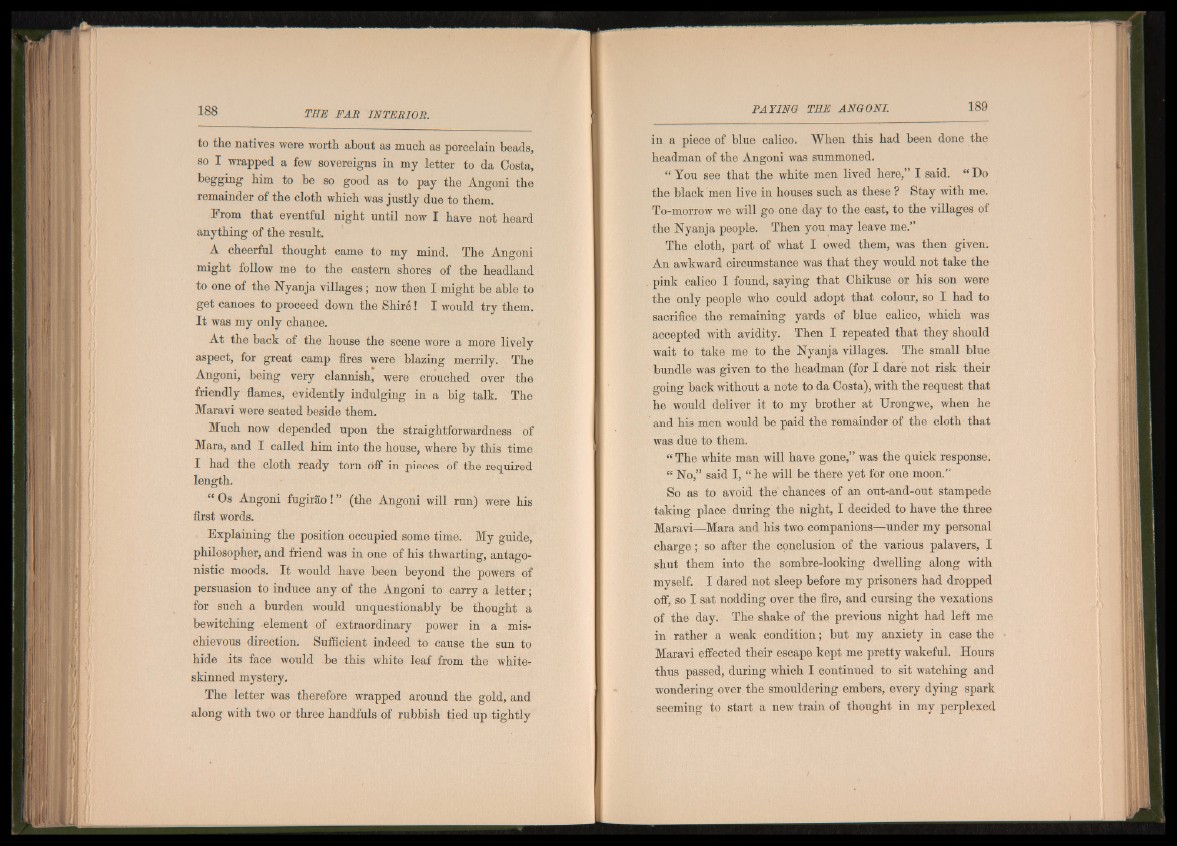
to the natives were worth about as much as porcelain beads,
so I wrapped a few sovereigns in my letter to da Costa,
him to be so good as to pay the Angoni the
remainder of the cloth which was justly due to them.
From that eventful night until now I have not heard
anything of the result.
A cheerful thought came to my mind. The Angoni
might follow me to the eastern shores of the headland
to one of the Nyanja villages; now then I might be able to
get canoes to proceed down the Shire! I would try them.
I t was my only chance.
At the back of the house the scene wore a more lively
aspect, for great camp fires were blazing merrily. The
Angoni, being very clannish, were crouched over the
friendly flames, evidently indulging in a big talk. The
Maravi were seated beside them.
Much now depended upon the straightforwardness of
Mara, and I called him into the house, where by this time
I had the cloth ready torn off in pieces of the required
length.
“ Os Angoni fugirao! ” (the Angoni will run) were his
first words.
Explaining the position occupied some time. My guide,
philosopher, and friend was in one of his thwarting, antagonistic
moods. I t would have been beyond the powers of
persuasion to induce any of the Angoni to carry a le tte r;
for such a burden would unquestionably be thought a
bewitching element of extraordinary power in a mischievous
direction. Sufficient indeed to cause the sun to
hide its face would be this white leaf from the whiteskinned
mystery.
The letter was therefore wrapped around the gold, and
along with two or three handfuls of rubbish tied up tightly
in a piece of blue calico. When this had been done the
headman of the Angoni was summoned.
“ You see that the white men lived here,” I said. “ Do
the black men live in houses such as these ? Stay with me.
To-morrow we will go one day to the east, to the villages of
the Nyanja people. Then you may leave me.”
The cloth, part of what I owed them, was then given.
An awkward circumstance was that they would not take the
pink calico I found, saying that Chikuse or his son were
the only people who could adopt that colour, so I had to
sacrifice the remaining yards of blue calico, which was
accepted with avidity. Then I repeated that they should
wait to take me to the Nyanja villages. The small blue
bundle was given to the headman (for I dare not risk their
going back without a note to da Costa), with the request that
he would deliver it to my brother at Urongwe, when he
and his men would be paid the remainder of the cloth that
was due to them.
“ The white man will have gone,” was the quick response.
I No,” said I, “ he will be there yet for one moon.”
So as to avoid the' chances of an out-and-out stampede
taking place during the night, I decided to have the three
Maravi—Mara and his two companions—under my personal
charge; so after the conclusion of the various palavers, I
shut them into the sombre-looking dwelling along with
myself. I dared not sleep before my prisoners had dropped
off, so I sat nodding over the fire, and cursing the vexations
of the day. The shake of the previous night had left me
in rather a weak condition; but my anxiety in case the
Maravi effected their escape kept me pretty wakeful. Hours
thus passed, during which I continued to sit watching and
wondering over the smouldering embers, every dying spark
seeming to start a new train of thought in my perplexed